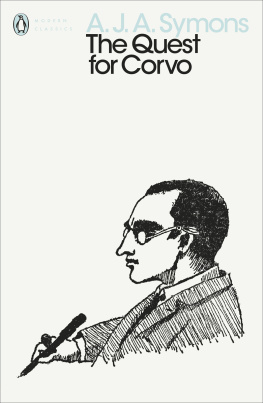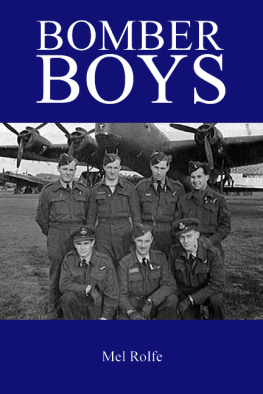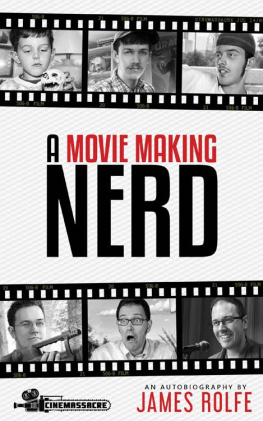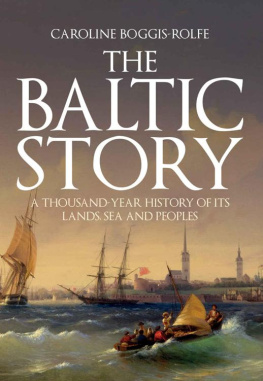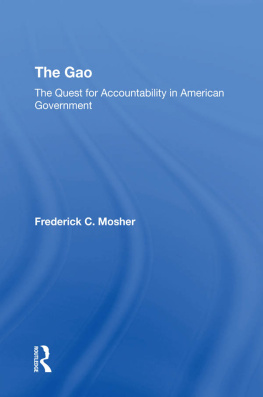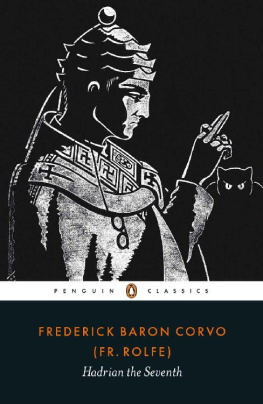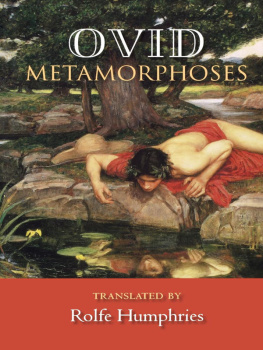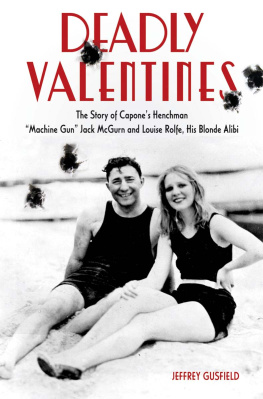PENGUIN MODERN CLASSICS
THE QUEST FOR CORVO
The short life of A. J. A. Symons (19001941) was described by his biographer as an intricate and largely harmless confidence trick. His many interests included the collection of musical boxes and rare books as well as the study and practice of forgery; these left him time to edit an anthology of Edwardian verse and compose studies of H. M. Stanley and other notable figures. He is remembered for The Quest of Corvo, one of the most remarkable biographies ever written, and for co-founding the Wine and Food Society.
PREFATORY NOTE TO THE ORIGINAL EDITION
Tradition and Experiment in Present-Day Literature (by various authors), O.U.P., 1929.
3: THE NEWSPAPER ATTACK
This gibe is inaccurate; corvus is raven, not crow; and it was the raven that Baron Corvo took as his emblem.
8: THE STRANGE HISTORIAN
Note: In justice to Mr Slaughter, I desire to emphasize to the reader that Rolfes strictures in this letter are unfounded, as also is his statement that Mr Slaughter was managing his affairs. In fact, Mr Slaughter did no more than call two or three times on Mr Grant Richards (as a friend without charge, not as a solicitor for a fee) in the hope of persuading the publisher to allow Rolfe to place his book elsewhere. When it became clear that Mr Richards would not relinquish his rights, Baron Corvo reopened negotiations by dropping his agent, as he ungratefully chose to call his friend.
9: THE CHRONICLES
Note: I quote these letters by the courtesy of Mr Grant Richards, who bears no resentment to the memory of the strange being who promised him undying enmity because letters sent to him care of the publisher were forwarded instead of refused. As will be seen subsequently, so far from being undying, Rolfes sense of grievance did not last long enough to prevent him from proposing a fresh alliance and more publications to Mr Grant Richards a few years later.
11: THE QUEER COLLABORATOR
Mr Bainbridge has recently written his autobiography, Twice Seven, in which he gives an interesting account of his memories of Rolfe, and a number of characteristic letters.
A. J. A. Symons
THE QUEST FOR CORVO
An Experiment in Biography
PENGUIN CLASSICS
UK | USA | Canada | Ireland | Australia
India | New Zealand | South Africa
Penguin Books is part of the Penguin Random House group of companies whose addresses can be found at global.penguinrandomhouse.com.
First published in Great Britain by Cassell 1934
Published in Penguin Books 1940
This edition first published in Penguin Classics 2018
Copyright 1955 by Michigan State University Press
All rights reserved
Cover illustration by Jon Wilson, after an original self-portrait sketched by Frederick Rolfe
ISBN: 978-0-241-31300-8
TO
Shane Leslie
Prefatory Note to the Original Edition
It will be apparent to any reader of the following pages that I am under heavy obligations to many friends and correspondents. Most of these debts are acknowledged, explicitly or by inference, in the course of my narrative; a certain number, however, require separate statement, and accordingly I take this opportunity to offer thanks to Messrs Vyvyan Holland and Vincent Ranger, whose careful reading of the proofs of this book has saved it from many errors; to Mr Shane Leslie, Mr Desmond MacCarthy, and Sir John Squire, who have for many years recognized Baron Corvos powers as a writer, and encouraged me in my task; to Mr D. Churton Taylor, who has spared no pains in ransacking both his office files and his memory; to Mr Stephen Gaselee, by whose kindness I was permitted to examine certain papers referring to Corvo contained in the Foreign Office files and in the Consulate at Venice; to Mr E. F. Benson for permission to print letters written by his brother; to Miss Kathleen Rolfe for permission to print letters written to her father; to Mr John Holden for a letter which had the length and merits of an independent essay; to my wife, always my patient listener; to Trevor Haddon for his interesting intermission; to Mr J. Maundy Gregory for many favours and his share in the Quest; to Mr and Mrs Philip Gosse, in whose garden the last chapter was written; to Mr Brian Hill and Dr Geoffrey Keynes, by whose assent I had access to the Corvo papers of the late A. T. Bartholomew; to Dr G. C. Williamson and Mr R. H. Cust for suggestions and the loan of material; to Mr G. Campbell, formerly Consul at Venice; to Mr Grant Richards, Professor R. M. Dawkins, Mrs van Someren, Mr Sholto Douglas, Canon Ragg and the many others who have supplied me with personal reminiscences, particularly Mr Harry Pirie-Gordon; and finally to Mr Ian Black, without whose practical assistance the writing of this book would have been delayed at least a year. Alone among the characters the Rev. Stephen Justin is presented under a fictitious name.
I have ventured to call The Quest for Corvo an experiment in Biography to signify that it is an attempt to fulfil those standards which I endeavoured to set up in an essay on biographical tradition published by the Oxford University Press in 1929.
1
The Problem
My quest for Corvo was started by accident one summer afternoon in 1925, in the company of Christopher Millard. We were sitting lazily in his little garden, talking of books that miss their just reward of praise and influence. I mentioned Wylders Hand, by Le Fanu, a masterpiece of plot, and the Fantastic Fables of Ambrose Bierce. After a pause, without commenting on my examples, Millard asked: Have you read Hadrian the Seventh? I confessed that I never had; and to my surprise he offered to lend me his copy to my surprise, for my companion lent his books seldom and reluctantly. But, knowing the range of his knowledge of out-of-the-way literature, I accepted without hesitating; and by doing so took the first step on a trail that led into very strange places.
Millard comes into this story more than once; and a short digression regarding him will not be out of place. I am glad, indeed, to pay his memory the tribute of these words, for to me at that time, living in the country by preference, in London by profession, he was one of the compensations of town, as he must have been to many others. His queer character and odd way of living offered unending contradictions and problems for an intelligent observer; nevertheless I could rely on him to provide literary conversation, and a glass of Val de Peas, at almost any hour of the day or night. Contrariety was perhaps his most consistent attribute. At Oxford he flouted the authorities in acts of noisy folly; in early manhood he became an enthusiastic Jacobite, ostentatiously laying his white rose at King Charles the Firsts feet every year, and acknowledging Prince Rupert of Bavaria as his rightful sovereign; in later years he became an ardent Socialist, wore flaming ties, and (to the astonishment of yokels) sang The Red Flag very loudly in quiet country inns. Yet, despite his Oxford antics, he took a good degree; despite his Jacobite feelings he fought very loyally for King George; and his Socialist views did not prevent him from incarnating most of the Conservative virtues.

